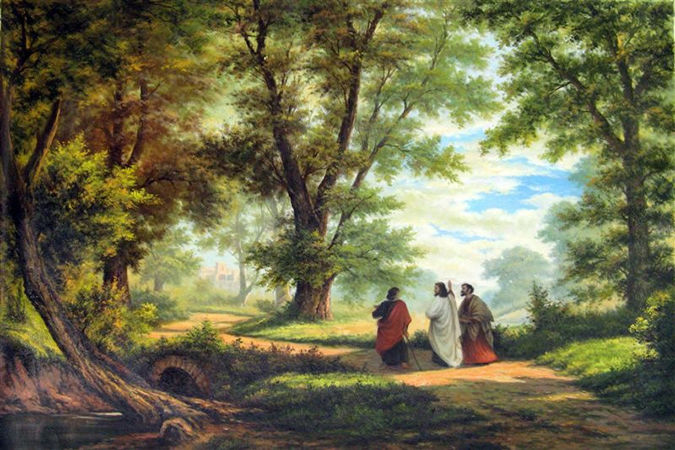It may seem odd to spend time with Jesus at a moment after his resurrection, just as we are preparing for his birth.
Shouldn’t we perhaps be accompanying Mary to visit her cousin Elizabeth, or maybe remembering the Angel Gabriel’s beautiful announcement about what would soon come to pass? Isn’t Advent about preparing for the manger, the star, the three Magi and the lowly shepherds who will first be told that the glory of God is breaking in?
Precisely because it is the Glory of God, the resurrected Jesus and the newborn Jesus are intricately tied. Christmas will not ever be celebrated in human history, carols will not be sung, Bethlehem’s quiet beauty of a star-filled sky will not be remembered without the Resurrection. It is in resurrection that God’s love for Jesus the Christ completely changes the course of history.
For me, the starlit Christmas sky has a matching scene of intense beauty, and this one is at dusk, more than 30 years later. The promise of Bethlehem is fulfilled here.
The world had been weary and wounded forever it seemed, and that heartbreak woven out of our selfishness, our greed, our war-making, all of it, had definitely not lessened since the birth of a son named Jesus to the young Mary and Joseph. When we pick up the story as told by Luke in the Gospel’s very last chapter (Luke 24:13-35), not only has the world not changed for the better, but we are placed on a road with two people as they are just about to give up on it all.
They had been through a horrible few days. Although they were not part of Jesus’ inner circle, they followed him around the region, listening to him teach, feeling that perhaps he would be the one to free them. This day, as they returned to their hometown, several miles away from Jerusalem, all hope was lost, the young rabbi who had filled them with expectation of a better world had been executed. Everyone was talking about it, it was a terrible and humiliating end to a promising life, and clearly Jesus was not “the one” after all.
Just then, a young traveler approached them, walking in their same direction and gently engaged them in conversation. He was just a humble pilgrim like them who wanted to know what had made them so sad. He drew near, he joined them, he walked with them, and while they walked he asked them questions.
The talk that morning in Jerusalem had been all about death, all about the end, but, the young man seemed incredulous and asked them for details. As they spoke they reflected. Finally, and reluctantly they admitted, well, maybe not everyone was certain it was the end; there were those women, after all, who ran back to tell the others that the tomb was empty. They were sure he was alive.
Jesus must have smiled as he heard that the promise of Bethlehem, the brilliant star, now shone from inside the tomb, where courageous women saw life and no longer death. However, the two almost said but kept to themselves, who believes women?
The young stranger asked them then to reconsider; if there were cracks of light in the story they had been told of doom and gloom, might there not be something in their sacred scriptures to help them make sense of it? The stranger wanted them to question what they thought they knew, and to do so with their community’s wisdom. They talked for a long while on that dusty road to Emmaus, pondering their community’s stories, noticing the promise made over and over again, widening the crack of light that the women had opened with their love earlier that day.
The sun now burned orange and crimson in the horizon, and somehow, the depth of hopelessness they had felt before had been slowly lifting, the young stranger was lifting it. And so, their appetite returned, their desire for life once more awakened. Please “stay with us,” they asked the traveler; the night was not a good time to traverse the hills.
I wonder if they noticed that they were no longer afraid. I wonder if they busied themselves preparing the meal, as the young traveler continued their conversation. I wonder if there was wine and laughter, until the horror of the last few days seemed to disappear replaced by an inexplicable joy, by new life.
At some point in the meal bread was passed around. Was it early, was it late? The traveler, they knew now, was a teacher; he had helped them to understand so much in the last few hours! So they asked him to do the blessing, he clearly was a holy man.
We can't know what happened then, but later, when they could no longer find him, they realized that the burning joy in their hearts had begun on the road. Their journey of hopelessness had been transformed into a coming home, to a table, to a banquet, and indeed to God’s exuberant promise of abundant life now and forever fulfilled.
Advent leads to Emmaus, life to life.
Cecilia González-Andrieu is associate professor of Theology at Loyola Marymount University and author of “Bridge to Wonder: Art as a Gospel of Beauty” (Baylor University Press, 2012).

